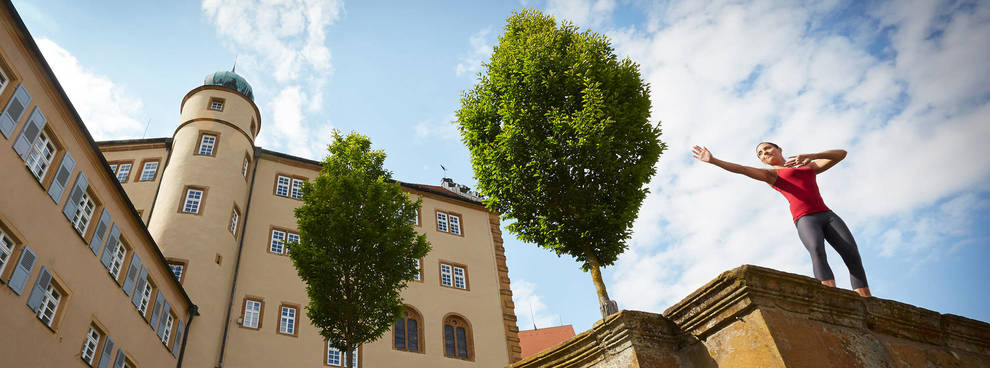
EDUCATION & HEALTH
Fit for music
Since 2003, the Kapfenburg Castle Foundation has been actively supporting musicians from an early age to keep fit for and through music-making.
The focus is on the salutogenetic approach, i.e. the health-promoting potential of music and music-making.
The salutogenetic approach, i.e. the health-promoting potential of music and music-making, is in the foreground, according to which existing resources are to be strengthened. In addition to musician's health, the field of elementary music education also has an important role to play, as support should begin at the earliest possible stage.
In order to achieve this goal, the project is to develop the potential of music and music-making to promote health.
To realise its goals, the Foundation carries out a variety of projects with which it gradually addresses all those people who make music themselves, are in instrumental training, teach music, come into contact with musicians from a medical and music-physiological point of view or have other tasks at music education institutions. Furthermore, the foundation is committed to researching the health-promoting effects of music.
With its beautiful ambience, good catering and appropriate overnight accommodation, Schloss Kapfenburg offers the ideal setting for professional and personal development.
The training centre can refer to many strong partners in its work. In addition to the health insurance company "Die Techniker", these include the Deutsche Rentenversicherung Baden-Württemberg, the Landesverband der Musikschulen Baden-Württembergs e.V. and the Verband deutscher Musikschulen. The foundation is also supported by Jast Ergo and the Blasmusikverband Baden-Württemberg e.V.
.
There are over 7 million recreational and amateur musicians in Germany, almost 120,000 people are professional musicians and more than 36,000 music educators teach at the approximately 900 non-profit music schools in the Federal Republic alone.
The numbers have risen continuously in recent years. This is a pleasing trend, because active music-making has a positive effect on the mental and social development of children and young people and maintains cognitive and emotional abilities in old age.
The number of music teachers has risen steadily in recent years.
Even before the beginning of a concrete musical education, the development of children can be positively influenced by applied elementary music education.
MUSICIAN HEALTH...
Making music means much more than just mastering an instrument. It promotes and challenges the physiological, emotional and cognitive abilities of the musician in equal measure, because a person has to coordinate a multitude of processes simultaneously when making music - breathing and movement, concentration and emotion. A musician can therefore only sing or play expressively if he or she feels completely at ease. It is therefore important to pay attention to elements that influence health and well-being while playing or singing.
Even simple factors, such as briefly warming up the muscles used before playing music or a back-friendly and unstrained posture, can prevent overstraining and postural damage.
Therefore, children should be given a solid basic knowledge of stress management techniques, physiological posture and other movement experiences in music lessons from the very beginning, in addition to playing their instruments. But also for adult musicians it is never too late to deal with the topic and to take preventive measures. Because this makes it possible to play music with joy and endurance well into old age.
ELEMENTARY MUSIC EDUCATION...
Music and rhythm are inherent characteristics of human beings and should be included and promoted in education from early childhood. As the basis of elementary music education, music and rhythm contribute to the healthy development of children's identity and personality.
Elementary music education provides for a differentiation of feeling and thinking functions as well as existing behavioural patterns and thus contributes to development to a special degree - be it in the area of individuality, musicality, creativity, motor skills, cognitive performance, social as well as emotional intelligence and, last but not least, the ability to express and communicate.
In practice, these contents are shown in the combination of music, movement and language. Children are introduced to singing, playing instruments and movement as well as dance. The mental area is trained in perception, thinking and symbolising music. Children thus experience directly through their own experience connections between breathing, phrasing, intonation, motor skills, rhythm and body awareness. Music teachers work in the instrumental area with small percussion instruments, rattles and other wooden instruments. The children learn songs, verses, instruments, dances, musical symbols and concepts.
Contact
Louisa Eckl
Referentin für Bildung & Gesundheit